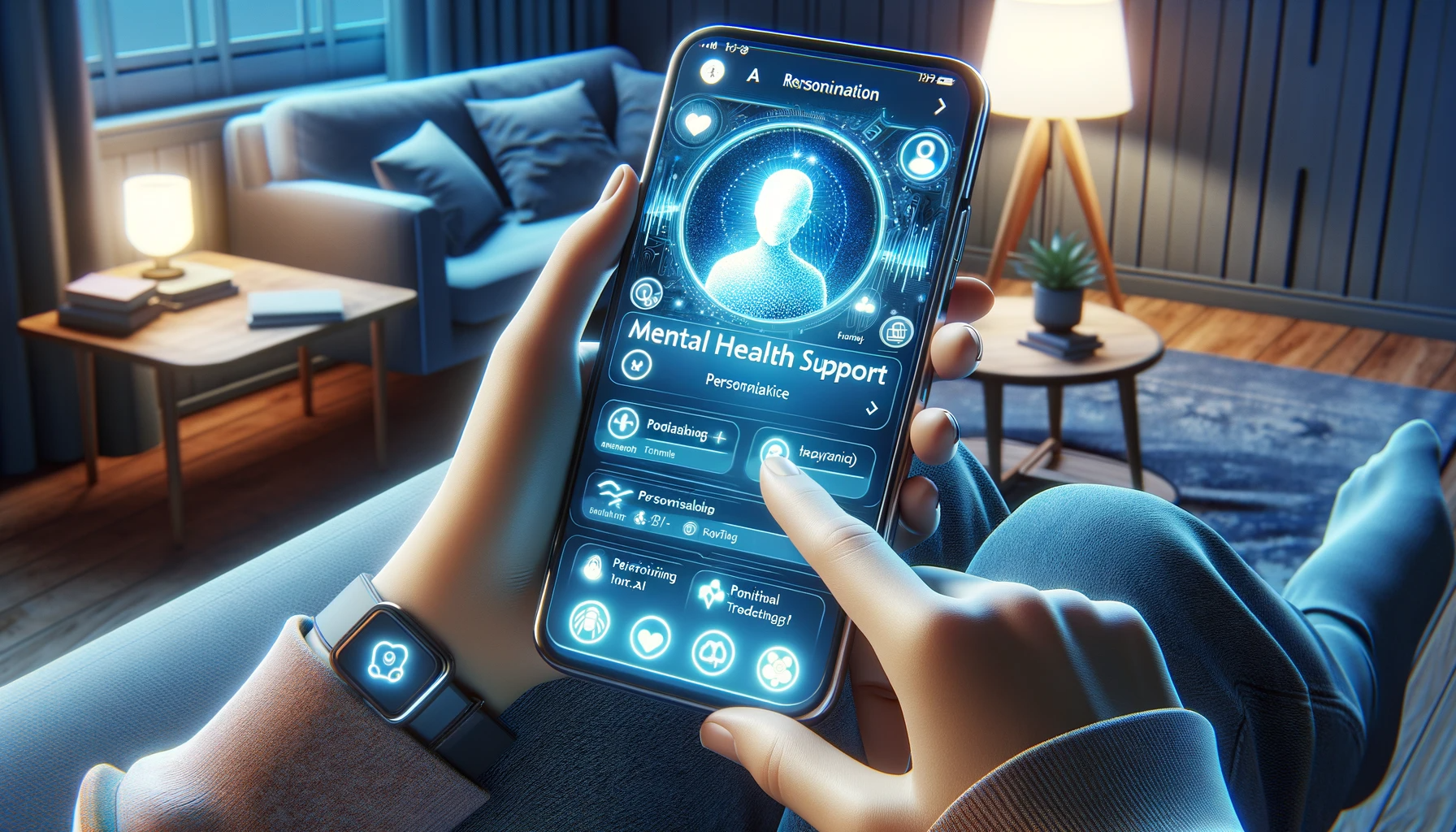In today’s fast-paced world, where stress, anxiety, and mental health challenges are increasingly prevalent, the role of artificial intelligence (AI) in providing personalized mental health support has emerged as a beacon of hope. This article embarks on a journey to explore the profound impact that AI is making in the realm of mental health, transforming the way individuals access and receive support for their well-being.
The introduction begins by setting the stage, highlighting the critical importance of mental health in contemporary society. It emphasizes that mental health issues affect millions globally, transcending age, gender, and cultural boundaries. The paragraph should resonate with readers by expressing empathy and understanding for the struggles many individuals face concerning their mental well-being.
Moreover, introduce the central theme: the role of AI in personalizing mental health support. Explain that AI technologies have the potential to revolutionize how mental health care is delivered, providing tailored interventions and resources that cater to individual needs and preferences. This sets the stage for the article’s exploration of AI’s impact on mental health support.
Finally, provide an overview of the article’s structure, giving readers a roadmap of what to expect in the subsequent sections. This could include a brief mention of discussing the current state of mental health, the applications of AI in personalization, and the benefits it brings.
The State of Mental Health: Challenges and Needs
Transition into the second section by delving into the current state of mental health and the challenges individuals face. Paint a vivid picture of the prevalence of mental health issues, emphasizing that they are not isolated incidents but rather a global phenomenon. Use statistics and real-world examples to illustrate the magnitude of the problem.
Highlight the stigma associated with seeking help for mental health issues and the impact it has on individuals’ willingness to access support. Discuss the consequences of delayed or inadequate mental health care, including prolonged suffering and decreased quality of life.
Moreover, emphasize the urgency of timely support and interventions. Discuss the repercussions of unaddressed mental health challenges, such as the potential for conditions to worsen, leading to crises or even life-threatening situations.
Conclude the section by highlighting the need for a solution that can address the challenges and meet the diverse needs of individuals seeking mental health support.
How AI Personalizes Mental Health Support
Transition to the third section by introducing the concept of AI-driven personalized mental health support. Define what this means, explaining that AI technologies such as machine learning and natural language processing are employed to customize mental health interventions based on individual characteristics.
Elaborate on how AI accomplishes personalization. Discuss the capabilities of AI algorithms in analyzing user data, behavior patterns, and preferences to tailor mental health programs. Use relatable examples to illustrate how AI chatbots, virtual therapists, and mobile applications can adapt and respond to an individual’s unique needs.
Incorporate case studies or success stories to showcase real-world applications of AI in personalization. Highlight instances where AI has made a significant difference in providing mental health support, emphasizing its potential to reach a wide audience.
This section should leave readers with a clear understanding of the role of AI in personalizing mental health support and set the stage for the subsequent sections where the benefits and real-world applications of AI will be explored in-depth.
Benefits of AI-Personalized Mental Health Support

The benefits of AI-driven personalized mental health support are far-reaching and can have a profound impact on individuals’ well-being. In this section, we will delve into the various advantages that AI brings to mental health care:
- Enhanced Accessibility: One of the primary benefits of AI-powered mental health support is its ability to break down geographical and logistical barriers. Traditional mental health services are often limited to specific locations, leaving individuals in remote or underserved areas with limited access to support. AI-driven solutions, on the other hand, can be accessed from anywhere with an internet connection. This accessibility ensures that individuals in urban centers, rural communities, or even those living abroad can receive the help they need.
- 24/7 Availability: Mental health challenges don’t adhere to a strict schedule, and crises can occur at any time, including late at night or during weekends when traditional services may be closed. AI chatbots and virtual therapists are available 24/7, providing individuals with immediate support when they need it most. This continuous availability can be a lifeline during moments of distress.
- Reduced Stigma: The stigma associated with seeking help for mental health issues remains a significant barrier for many individuals. AI-based mental health support offers a level of anonymity and privacy that can help reduce this stigma. Users may feel more comfortable sharing their thoughts, feelings, and concerns with AI systems, as they don’t face the fear of judgment that often exists in human interactions. This can encourage more people to seek the support they need without the fear of being labeled or stigmatized.
- Early Warning Signs: AI’s ability to analyze user data and behavior patterns can be a game-changer in mental health care. These algorithms can detect early warning signs of deteriorating mental health, even before individuals may recognize these signs themselves. By analyzing language use, engagement patterns, and other data points, AI can identify changes in mental well-being and provide timely interventions. This proactive approach can prevent crises, reduce the severity of symptoms, and improve overall mental well-being.
Real-World Applications and Success Stories
In this section, we will explore real-world examples of AI-driven personalized mental health support and share inspiring success stories that highlight the tangible impact of these technologies:
- Organizations and Platforms: Numerous organizations, startups, and platforms have recognized the potential of AI in mental health support and have implemented innovative solutions. We’ll discuss well-known apps, chatbots, and online therapy services that leverage AI to provide assistance. Examples may include platforms that offer guided meditation and relaxation exercises, AI-powered virtual therapists, and mobile apps designed to address specific mental health challenges.
- Individual Testimonials: Personal stories and testimonials from individuals who have experienced transformative changes through AI-powered mental health solutions are compelling evidence of the technology’s effectiveness. These stories should highlight the diverse ways in which AI can positively impact mental well-being. Whether it’s overcoming anxiety, managing depression, or coping with stress, these firsthand accounts can resonate with readers and illustrate the potential of AI in improving mental health.
- Diversity of Applications: Showcase the versatility of AI applications in mental health support. Discuss a range of solutions, from self-help apps that offer relaxation techniques and mood tracking to AI-driven therapy sessions designed to address specific mental health disorders. By highlighting the diversity of applications, readers can gain a comprehensive understanding of how AI can cater to a wide spectrum of mental health needs.
Ethical and Privacy Considerations
The ethical and privacy considerations surrounding AI in mental health support are paramount. As AI technology becomes increasingly integrated into this critical area, it’s essential to address these concerns:
- Data Privacy: AI systems rely on vast amounts of user data to personalize interventions effectively. However, the collection and handling of this data must be approached with utmost care. Discuss concerns related to data privacy and the need for robust data protection measures. Emphasize the importance of encryption, secure storage, and stringent access controls to safeguard user information and maintain confidentiality.
- Bias and Fairness: AI algorithms are not immune to bias, and in the context of mental health, bias can have significant implications. Address the potential for bias in AI algorithms and how it can impact the accuracy and fairness of mental health assessments. Explore ongoing efforts to reduce bias in AI systems and ensure that they provide equitable support for individuals from diverse backgrounds.
- Informed Consent: Informed consent is a fundamental ethical principle in healthcare, including mental health support. Explain the importance of informed consent when individuals engage with AI-driven mental health support. Users should be fully aware of how their data will be used, the capabilities of the AI system, and their rights concerning their information. Transparent communication and the ability to opt-in or opt-out of specific features are essential components of ethical AI deployment in mental health.
The Future of Mental Health Support: AI’s Role
As we look ahead to the future of mental health support, it becomes evident that AI will play an increasingly prominent role. In this section, we explore the potential trajectories for AI-driven mental health care:
- Advancements in AI: Predict how AI technology will continue to advance, offering even more personalized and effective mental health support. Discuss potential developments, such as improved chatbots with enhanced natural language understanding, virtual therapists with greater empathy and emotional intelligence, and AI-driven interventions that adapt in real-time based on user feedback and progress.
- Integration with Human Professionals: Emphasize that while AI can provide valuable support, it is not a replacement for human expertise and empathy. Discuss the ongoing need for human professionals in mental health care. Explore the potential for AI-human collaborations, where AI systems complement the work of therapists, counselors, and other mental health professionals. These collaborations may involve AI providing data-driven insights and recommendations to human experts, allowing for more tailored and effective interventions.
- Ethical Guidelines and Regulation: Highlight the importance of ethical guidelines and regulation in the deployment of AI in mental health. Discuss the role of regulatory bodies, mental health organizations, and AI developers in ensuring responsible and ethical AI use. The establishment of clear ethical standards and adherence to privacy and data protection regulations will be crucial in maintaining trust and ensuring the safe and ethical use of AI in mental health support.
By examining these considerations, we gain insights into the evolving landscape of mental health care, where AI complements traditional approaches and expands the reach and effectiveness of support systems. The careful balance between technological innovation, ethical principles, and human expertise will shape the future of mental health support.

Conclusion
In the ever-evolving landscape of mental health care, artificial intelligence (AI) stands as a powerful ally, offering transformative possibilities for personalized support and intervention. This article has explored the profound impact of AI on personalized mental health support, highlighting the benefits, real-world applications, ethical considerations, and the future of this burgeoning field.
As we conclude, it is essential to underscore the pivotal role AI is poised to play in mental health care. The benefits are evident—enhanced accessibility, 24/7 availability, reduced stigma, and early warning signs detection. These advantages are making mental health support more accessible, timely, and responsive to individual needs, ultimately improving the well-being of countless individuals worldwide.
Real-world success stories and the diverse applications of AI have demonstrated its potential to address a wide spectrum of mental health challenges. From self-help apps that guide users through relaxation techniques to AI-driven therapy sessions tailored to specific disorders, AI is reshaping how individuals receive support for their mental well-being.
However, the integration of AI into mental health care also brings forth ethical and privacy considerations. Safeguarding user data, addressing bias in algorithms, and obtaining informed consent are essential steps in ensuring that AI deployments adhere to ethical standards and prioritize user trust and confidentiality.
As we look to the future, AI’s role in mental health support will continue to evolve. Advancements in AI technology will lead to more sophisticated and empathetic AI systems that adapt to individual needs. The integration of AI with human professionals will create synergistic partnerships that optimize mental health outcomes.
In this journey towards an AI-enhanced mental health care ecosystem, the development of ethical guidelines and regulatory frameworks will be pivotal. These guidelines will ensure that AI serves as a force for good, upholding privacy, fairness, and responsible deployment.
In conclusion, AI is not replacing human compassion and expertise but rather augmenting and expanding the reach of mental health support. With responsible development, ethical considerations, and a commitment to user well-being, AI-powered personalized mental health support holds the promise of transforming the way we understand, access, and experience mental health care—a future where support is more personalized, accessible, and effective for all.
